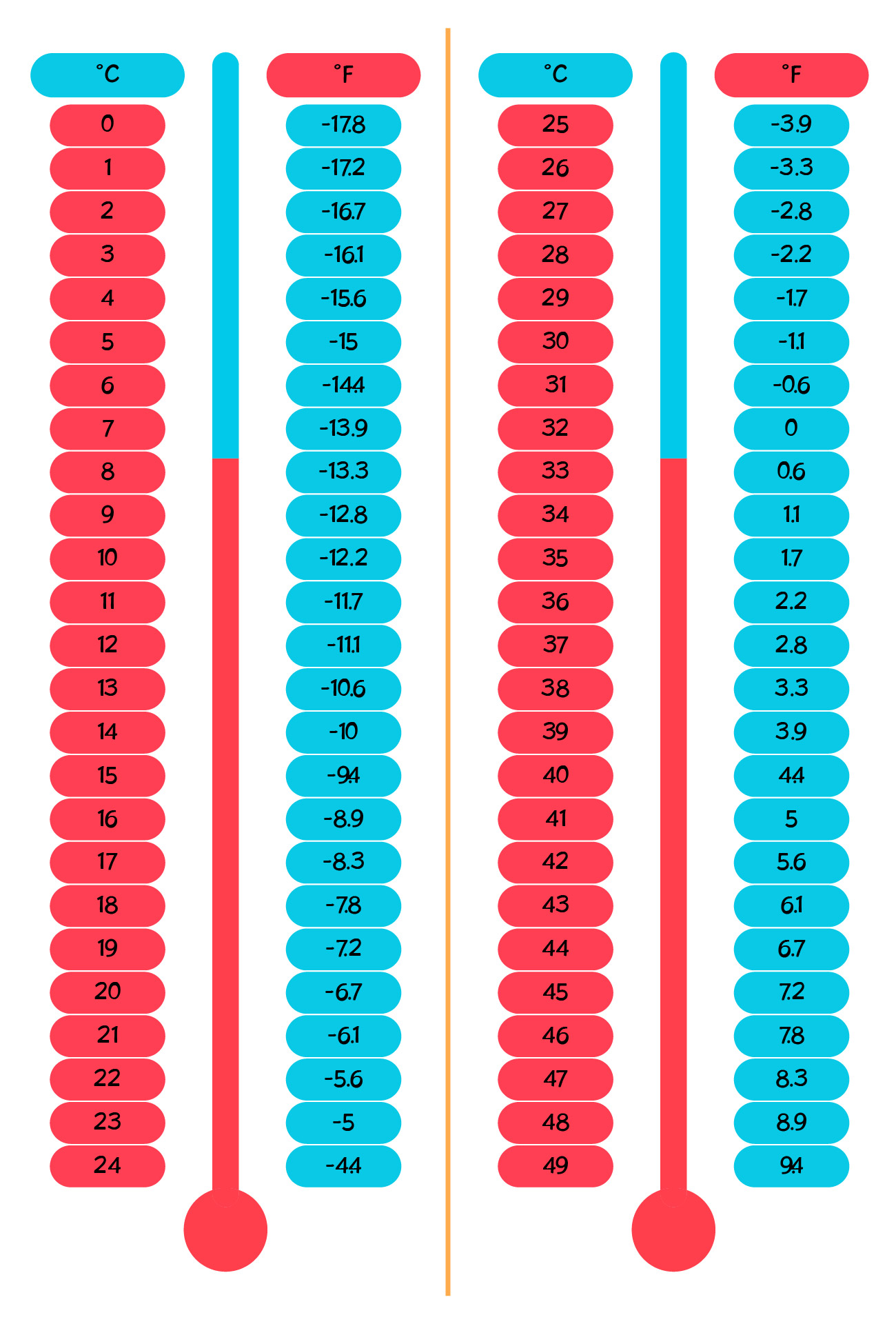Temperature is a fundamental aspect of our daily lives, influencing everything from weather forecasts to cooking. One of the most common conversion tasks is between Celsius and Fahrenheit. This article delves into the intricacies of the temperature table, specifically the Celsius to Fahrenheit conversion, providing insights and practical tools for understanding these temperature measurements.
With the growing importance of global communication, understanding temperature scales has become essential. Whether you're traveling to a country that uses Celsius or Fahrenheit, or simply trying to understand a recipe that uses a different measurement, having a grasp on these conversions is invaluable. This article will not only provide a comprehensive temperature table but also explore the history, applications, and practical uses of both Celsius and Fahrenheit scales.
By the end of this article, readers will have a solid understanding of how to convert temperatures between Celsius and Fahrenheit, the significance of these measurements in various fields, and the best practices for ensuring accurate conversions. Let’s dive into the world of temperature measurements!
Table of Contents
- 1. What is Celsius?
- 2. What is Fahrenheit?
- 3. The History of Temperature Scales
- 4. The Celsius to Fahrenheit Conversion Formula
- 5. Temperature Table: Celsius to Fahrenheit
- 6. Practical Applications of Temperature Conversion
- 7. Common Mistakes in Temperature Conversion
- 8. Conclusion
1. What is Celsius?
Celsius, also known as centigrade, is a temperature scale used worldwide, primarily in scientific contexts and most countries outside the United States. The scale is based on two fixed points: the freezing point of water at 0 degrees Celsius and the boiling point at 100 degrees Celsius, under standard atmospheric conditions.
2. What is Fahrenheit?
Fahrenheit is a temperature scale primarily used in the United States and a few Caribbean nations. The scale is based on an arbitrary zero point, which is the freezing point of a saltwater solution. The freezing point of water is at 32 degrees Fahrenheit, while the boiling point is at 212 degrees Fahrenheit.
3. The History of Temperature Scales
The Celsius scale was developed by the Swedish astronomer Anders Celsius in 1742. Originally, the scale was inverted, with 0 representing the boiling point of water and 100 the freezing point. In contrast, Daniel Gabriel Fahrenheit created the Fahrenheit scale in 1724, proposing a scale that was more suited to human experience, particularly in weather forecasting.
4. The Celsius to Fahrenheit Conversion Formula
The formula to convert Celsius to Fahrenheit is:
F = (C × 9/5) + 32
Where F is the temperature in Fahrenheit and C is the temperature in Celsius. This formula allows for easy conversion between the two scales, accommodating for the different intervals used in each scale.
5. Temperature Table: Celsius to Fahrenheit
Here’s a comprehensive temperature table for quick reference:
| Celsius (°C) | Fahrenheit (°F) |
|---|---|
| -40 | -40 |
| 0 | 32 |
| 10 | 50 |
| 20 | 68 |
| 30 | 86 |
| 40 | 104 |
| 100 | 212 |
6. Practical Applications of Temperature Conversion
Understanding temperature conversion is crucial in various fields:
- Culinary Arts: Many recipes list temperatures in Fahrenheit, while most scientific cooking methods use Celsius.
- Weather Forecasting: Meteorologists often report temperatures in different scales based on regional preferences.
- Scientific Research: Many scientific studies and reports use Celsius for clarity and uniformity.
7. Common Mistakes in Temperature Conversion
While converting temperatures, some common mistakes include:
- Forgetting to use the correct formula.
- Misplacing decimal points.
- Using approximate conversions instead of precise calculations, which can lead to significant errors in scientific contexts.
8. Conclusion
Understanding the Celsius to Fahrenheit conversion is not just a mathematical exercise; it’s a vital skill in our increasingly globalized world. With the temperature table provided, readers can easily convert temperatures and appreciate the differences between these two popular scales. Feel free to leave a comment, share this article with others, or explore more about temperature measurements and conversions!
Thank you for reading! We hope you found this article informative and easy to understand. We invite you to return for more articles on topics that matter to you.
- 1230857 Tyler Perry Net Worth Age Height House Wife Son
- Thay Ksada
- 1470855 Zack Lugos Biography Age Height Net Worth Girlfriend Brother
- La Freeway Protest
- Oleksandr Zinchenko
- 1534693 Piece Female Characters Deserve Attention
- Kristy Mcnichol
- Tiffany Link Earrings
- Josh Allen Old Tweets


